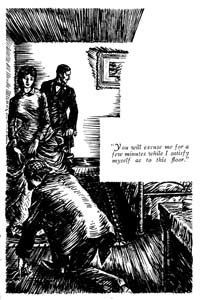






| "An Eley’s No. 2 is an excellent argument with gentlemen who can twist steel pokers into knots." It is uncertain what kind of revolver Holmes is asking Watson to carry, since the Eley Brothers manufactured ammunition, not guns. …a narrow white-counterpaned bed…. A bed with a white bedspread. …a square of Wilton carpet in the centre. Wilton carpet is a short-weave carpet with a sheared pile that gives it a velvet texture, as opposed to Brussels carpet, which is unsheared. In Holmes’s times, Brussels was considered everyday carpet, used in private areas of the house, while the more expensive Wilton carpet was a luxury that might only appear in rooms where guests were received. Perhaps Julia and Helen Stoner, being deprived in most areas, allowed themselves a little extravagance.
Holmes must test his theory before he reveals it, thus keeping both Helen Stoner and the reader in suspense. "Palmer and Pritchard were among the heads of their profession." William Palmer and Edward William Pritchard were two 19th-century doctors convicted of poisoning family members. Holmes’s statement that they were "among the heads of their profession" must be ironic, since the only profession either excelled at was murder. "It is a swamp adder!" cried Holmes—"the deadliest snake in India. He has died within ten seconds of being bitten." Sherlockians have argued long and hard about what species of snake might have bitten Dr. Roylott. The color, description, and behavior of this snake fit no known reptile, and no venomous snake can kill its victim in ten seconds. "Violence does, in truth, recoil upon the violent, and the schemer falls into the pit which he digs for another." Holmes rarely quotes Scripture, although he often comments on the justice or injustice of a criminal’s fate. Here, he expresses sentiments that recur several times in the King James Bible. Ecclesiastes (10:8): "He that diggeth a pit shall fall into it; and whoso breaketh an hedge, a serpent shall bite him," and Proverbs (26:27), "Whoso diggeth a pit shall fall therein: and he that rolleth a stone, it will return upon him." | ||||
Copyright ©
2006 Stanford University. All rights reserved. Stanford, CA 94305, (650)723-2300
l Terms
of Use
